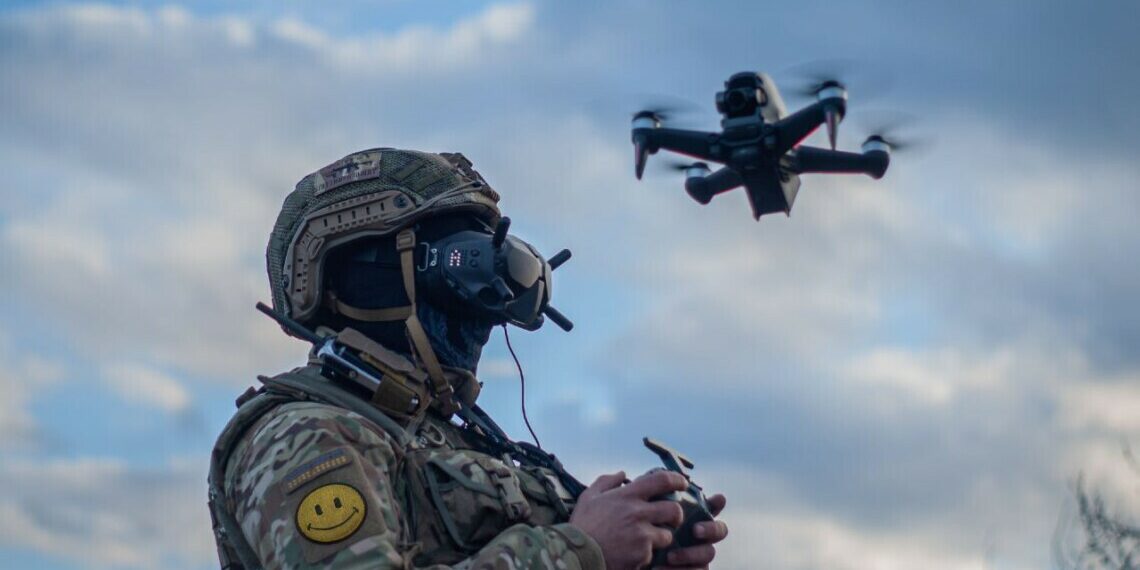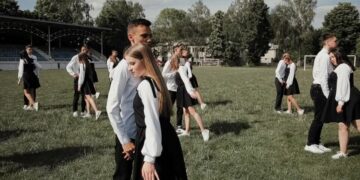In an era defined by rapid technological advancement, few phenomena hold as much transformative power as Artificial Intelligence (AI). From revolutionizing our daily lives to reshaping the geopolitical landscape, AI’s influence is profound and multifaceted. This collection of student reflections delves into the very heart of this impact, offering a compelling array of perspectives on how technology, and AI in particular, is influencing us, our world, and critically, the ongoing war in Ukraine.
As the war in Ukraine continues, it serves as a stark, real-world laboratory for observing AI’s applications and implications. Our students courageously examine how AI is employed on the battlefield—from intelligence analysis and drone operations to cybersecurity defenses—and simultaneously dissect its role in information warfare, where deepfakes and propaganda can blur the lines of truth. They question the human role in AI-driven decisions and highlight the urgent need for responsible development and clear ethical frameworks.
Aleksandra Sulim:
Artificial intelligence (AI) is profoundly transforming modern armed conflicts, demonstrating both enormous potential and significant risks. On the one hand, AI can become a key tool for saving the lives of soldiers and increasing the effectiveness of combat operations. For example, AI-enabled weapon systems can autonomously identify and engage targets by analyzing huge amounts of data in real time. This significantly accelerates the decision-making process, reduces the human factor and allows tasks to be performed in dangerous conditions without the direct presence of soldiers, which certainly saves lives.
On the other hand, however, AI is a powerful tool for conducting information warfare and psychological operations. Hostile propaganda actively uses AI technologies, in particular deepfakes, to create extremely realistic but completely fictional video materials. These can be images of “military personnel” complaining about poor conditions or low morale, although such individuals do not actually exist. The goal of such actions is to undermine the public’s trust in their military, demoralize society, and reduce the overall motivation to support the armed forces. In a world where information spreads quickly and its authenticity is difficult to verify, such attacks become extremely effective because they play on emotions and create a false impression of reality.
Thus, the impact of AI on war is ambivalent. It offers innovative solutions for defense and increased combat readiness, but it also opens up new opportunities for insidious information campaigns. It is important to understand these aspects in order to effectively use the advantages of AI and counteract its negative consequences.
Kateryna Udovychenko:
AI, for sure, is a powerful tool that can be used for both good and bad purposes. With its ambiguity, AI does come with a bunch of problems. As people rely on it more and more, they become addicted to its constant availability and helpfulness. They even stop googling things for themselves and just ask one of the chat bots. That’s troubling.
That does not mean, though, that it is inherently bad. It is nothing but a tool, just like a knife, metaphorically – you can harm someone with it, or you can open a package and cut some food. No matter how many troubles it causes, AI is necessary in so many fields. For example, in medicine it identifies skin cancer and in period tracking apps it predicts the menstrual phase of the user. And we, Ukrainians, use AI to train our war drones as well.
One of the challenges we face is the fact that we are not the only people training AI to aid us in the war. Obviously, it can be used against us, as a way of propaganda online, or as a guide for the drones that attack us so often. But just like humans once invented spears, then guns, then planes, AI is simply just another invention among others, and if it weren’t for it, some other tool would have taken its place.
Svitlana Burmistrova:
Artificial Intelligence is already playing an important role in Ukraine’s resistance against russian aggression. AI helps process satellite images and drone footage quickly, identifying enemy positions and movements with speed that no human team could match. It supports logistics, helps locate survivors under rubble, and protects communication lines by detecting and preventing cyberattacks. AI-driven tools also support our armed forces with more accurate targeting, saving ammunition and reducing risks to civilians.
But these technologies also bring serious challenges. AI systems can make deadly mistakes if they misinterpret data or are used without enough human oversight. There is a danger that the enemy will use similar tools — or even turn our own technologies against us. There are also moral concerns about using machines to make life-and-death decisions in war. And as powerful as AI is, it cannot replace the courage, responsibility, and humanity of real people.
Used wisely, AI can help protect our people and support our defenders. But we must always keep control in human hands — and never forget what we are fighting for.
Diana Kohut:
In times of crisis and conflict, technology can be both a tool and a turning point. Artificial Intelligence offers powerful ways to help us struggle through uncertainty: from analyzing critical information in real-time to exposing disinformation, preserving cultural memory, and supporting mental health. AI can assist in telling the world our stories — quickly, clearly, and truthfully — when human voices are silenced or scattered.
But with these opportunities come serious challenges. Misinformation can spread faster than truth. Automated systems can be biased or manipulated. And sometimes, technology can feel distant when what we need most is human understanding. At AlongCameTheWar, we believe AI should empower people, not replace them — helping us fight not only for survival, but for dignity, memory, and the future we deserve.
Artificial Intelligence is changing many aspects of human life, including the way wars are fought. In modern conflicts, AI plays an important role in both defense and attack strategies. AI technologies help armies analyze large amounts of data, detect threats faster, and make better decisions on the battlefield.
One of the main uses of AI in war is surveillance. AI-powered drones and satellites can monitor enemy positions and provide real-time information to military commanders. This allows faster reactions and more precise actions during military operations.
AI is also used in cyber warfare. Intelligent systems can detect and stop cyberattacks, as well as find weaknesses in enemy networks. However, the use of AI in war raises serious ethical questions. Autonomous weapons, which can make decisions without human control, can cause unexpected consequences and civilian casualties.
The war in Ukraine has shown how new technologies, including AI, are already part of modern warfare. AI helps with logistics, intelligence, and even analyzing social media to predict enemy actions.
In the future, AI will likely become even more important in wars. That’s why it is essential to develop clear rules for its use, so that technology helps protect people, not harm them.
Daria Yakovleva:
Let’s be real. War in Ukraine? It’s hell. People are losing their homes, their lives, everything. Russia’s full-scale invasion in 2022 turned peaceful cities into ruins overnight. But Ukrainians? They’re different. They are incredibly brave, intelligent, and stubborn in the best sense of the word. And now the most interesting part – artificial intelligence has joined the fight, not in some fantastical form of robots (yet), but in a real, harsh and useful way. AI helps detect tanks in satellite images, identify fake news, protect websites from hackers, and even assists drones in flying smarter. Some volunteers even use it to translate texts on the fly or detect mines. It’s as if Ukraine’s technical brain has merged with its warrior heart. But there’s a catch. AI is cool, but it can quickly turn into something dark. Deepfakes, killer drones, machines that decide who lives and who dies? It’s like the TV show Black Mirror. And Ukraine, oddly enough, is a kind of laboratory for testing all of this. Conclusion: war is terrible. But Ukrainians are turning pain into strength, and AI is part of that struggle. The world is watching. And how we use this technology now may determine what ‘war’ means in the future.
Anastasia Voitsekhovska:
How AI Can Help – and What We Should Watch Out For
Artificial Intelligence is already making a real difference. It supports doctors in diagnosing diseases, helps students learn in new ways, and even assists in solving environmental problems. It can process data faster than any human, making our decisions smarter and more efficient.
Yet, AI isn’t perfect. It can reflect human biases, threaten certain jobs, or make choices we don’t fully understand. That’s why it’s so important to develop and use AI responsibly — with ethics, transparency, and human values at the center. Only then can it truly help us move forward.
Yulia Baran:
In military actions: AI analyzes intelligence data from drones and satellites, detecting enemy equipment and movement. It optimizes supply logistics and controls autonomous drones that can attack without constant supervision. AI is also important for cybersecurity, identifying attacks.
In peaceful life: AI is used in navigation (like Google Maps) and for instant language translation. In medicine, it helps monitor health—for example, a smart watch tracks sleep, activity, heart rate, etc. In education, AI personalizes learning by adapting materials and helping teachers check assignments.
Bogdan Hatsenko:
How AI Can Help Us and What Challenges We May Face
Artificial Intelligence (AI) can be a powerful tool to help us solve many global problems. It can support healthcare by detecting diseases early, improve education through personalized learning, and help fight climate change by analyzing environmental data. AI also boosts productivity in industries and assists in crisis response, such as during natural disasters or pandemics.
However, using AI also brings serious challenges. There are risks of job loss due to automation, data privacy concerns, and biased decision-making if AI systems are not trained fairly. Moreover, the misuse of AI in areas like surveillance or weaponry poses ethical threats. To benefit from AI, we must use it responsibly and ensure strong regulations are in place.
Maryna Andrushko:
Artificial intelligence is not something new now. People are used to using it every day all over the world. However, when we talk about AI as a tool in war, the first thing that comes to mind is emotional support. After all, the emotional state of Ukrainians is unstable now, most people are getting sick. Unfortunately, Ukrainians are losing loved ones, and they want to share their thoughts and experiences with someone, but in modern realities it is difficult to trust someone. This is how technology comes to the rescue. The famous GPT chat is used not only for scientific purposes, but also for personal ones. It supports, gives advice if asked. And this is, on the one hand, incredible help.
On the other hand, we still need to maintain our confidentiality because few of us know how such chats collect information about us. Therefore, artificial intelligence can pose risks to humanity regarding its security. Against this background, fake information, propaganda, and possible blackmail are created and spread. So, people should be careful about the information you provide and receive from AI, because without awareness of the information we consume, we are in danger.
Sophia Krasnovyd:
AI can help us in many ways — it supports learning, solves problems, and even listens when we need to talk. Speaking with AI, for example, helps people practice English anytime, anywhere. You can ask questions, get feedback, or just have a friendly chat. But there are also challenges. Occasionally, AI gives wrong answers or doesn’t understand feelings. People may also become too dependent on it. Still, if we use AI wisely — like a smart tool, not a human — it can really help us grow, learn, and connect.








